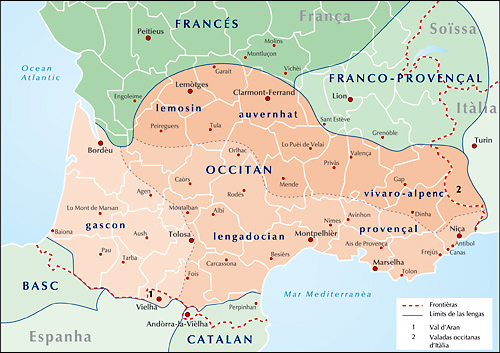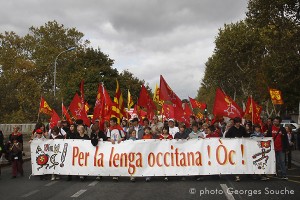Print  |
|


Finding a place for Occitan in the French Republic
Posted by Marie Jeanne Verny on September 15, 2011
By Marie Jeanne Verny, lecturer at the University of Paul Valéry, in Montpellier, France, and FELCO secretary (Fédération des Enseignants de la Langue et Culture d’Oc – “Federation of the educators of Oc language and culture”).

Carte Occitan
What is Occitan?
Occitan, also known as langue d’Oc, is spoken over eight regions of southern France (one third of the country), as well as in 12 valleys of the Italian Alps and in the Val d’Aran, Spain.
The number of speakers is usually estimated between 1 and 2 million, although many more actually understand Occitan.
The language has different variations, which do not prevent communication or the sharing of cultural creation.
French vs. Occitan
Occitan was attested in the 10th century, and rapidly became the language of literary creation and that of administration.
But the langue d’Oc soon had to face French, a langue d’Oïl in the northern part of the country: a mere symbol of royal power at first, French eventually became the official language, that of the elite, in the course of the 16th century.
Massive schooling at the end of the 19th century imposed French as a language of communication and led to cut off the transmission of the langue d’Oc within the family circle. While the language did remain the main language of daily communication for the working classes until the dawn of the 20th century, it appeared quite normal, then, including to those concerned, that social promotion implied school, French, and thus, the repression of a dialect associated to working-class origins.
This context of massive conversion to French in the Occitan population lasted throughout the entire 20th century. Some deemed this conversion to be mechanically and ideally deliberate, yet in fact it sheltered a complex phenomenon of social self-depreciation.
Early stages of a formal recognition within the education system
Since the 1950s, Occitan is beginning to receive some degree of public recognition, particularly in the education spheres.
The Deixonne law of 1951 gingerly opened the way for Occitan to enter education, and the way gradually became larger: optional introduction classes, bilingual classes on a parity basis with public education, private associative schools – known as calandretas. First steps in the training of teachers at university, a secondary school teaching qualification in Occitan, and a specific examination for school teachers have also been established since. Occitan is now studied by tens of thousands of students from nursery school to university. And the number of job offers requiring a decent command of the language currently exceeds the number of graduates!
A change in mentality
Since the end of World War II, as the transmission within families gradually faded, major changes have occurred in the representations of the language – linguistic surveys show that a small yet sizeable proportion of the population remains faithful to Occitan.
The term Patois [used as “lingo”], while still employed to refer to the language, is slowly being given up in favour of the very term Occitan, or more limited yet underogatory geographical terms (Béarnese or Provençal for instance, which are variants of the langue d’Oc).
Likewise, the gradual diffusion of a graphic system common to all the geographical varieties contributed to support and strengthen the idea that Occitan, in its diversity, could stand as a language “like any other”.
Sustaining revival
In the wake of this change of mindset, new conducts have appeared and keep developing, such as bilingual signalling systems or the use of Occitan in public events, formal or unformal.
The emergence of an original form of literature is also being observed, in which the age-old tradition of poetry finds itself carried by a wealth of published prose (Max Rouquette, Bernard Manciet, Marcelle Delpastre, etc.). The same goes for a modernising musical creation: 70s and 80s “nouvelle chanson”, recent bands such as Massilia or Fabulous Troubadors…
Even more recently, Occitan has forcefully entered the Internet with an abundance of specialized websites, blogs, and message boards where users, young ones for the most, use Occitan as a language of expression.
Nevertheless, such demonstrations of a favourable feeling, active or passive, towards the Occitan language and culture, should not hide the remaining obstacles: the standstill in family transmission, the absence of social visibility, the absence of formal recognition, and the lack of pro-active policies in favour of the language make it difficult to envision an genuine trend reversal.
There is no denying that despite significant legal provision (UNESCO convention on the protection and promotion of the diversity of cultural expressions, EU resolution in favour of regional languages, article no. 75-1 of the French constitution, etc.), France still has a hard time measuring the effective cultural wealth of its plurilingualism and that of its creative potential. Thus are the other languages of the country thought of and pointed out, at best, as a merely emotional extra touch of soul, at worst, as an impediment to national unity and/or republican construction. Hence the emergency to adapt legislation by drafting a law, that has been promised on several occasions.

Photo : Georges Souche (http://georges-souche.com/)








